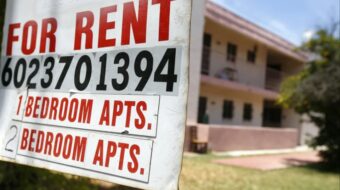
NEW YORK – Newly elected city Comptroller John Liu is taking action to help protect communities from big developers and corruption.
Liu, the first Asian American elected to a top New York City office, has announced that he will set up a task force to establish more oversight over so-called Community Benefit Agreements between developers and community groups.
CBAs are generally supposed to ensure that a developer provides services agreed upon by both sides in exchange for community support for a particular project. Residents are in theory able to win such things as a certain percentage of affordable housing, jobs, parks and so on. Developers can receive zoning changes, no-bid contracting, tax subsidies – even the right to invoke eminent domain and seize private property for their project.
While such agreements are in use worldwide, New York City CBAs have drawn scrutiny.
Questions have arisen as to who represents a community and how enforceable an agreement is. Developers here have used CBAs to gain an upper hand in many communities and, in some cases, as a way to divide and even radically alter neighborhoods against the wishes of local residents.
Echoing concerned New Yorkers, Liu said, “In the absence of standards … these agreements will become more problematic and ultimately irrelevant.”
In Brooklyn, a CBA was signed in 2005 between Forest City Ratner, a multi-billion-dollar private developer which had already been guaranteed huge subsidies from the city, and a number of groups purporting to represent the community. The agreement was for Ratner’s proposed Atlantic Yards project, which will, through eminent domain, throw people out of their homes and businesses and radically alter downtown Brooklyn.
Critics of the project note that it will displace thousands of local residents and replace decent existing housing with luxury condos in a neighborhood where the current median income is less than $30,000.
Mayor Michael Bloomberg announced the agreement in a flurry of press releases,. However, neither Bloomberg nor any city agency were signatories. Only Forest City Ratner and eight civic groups that don’t directly represent the area were signers. Develop Don’t Destroy Brooklyn, a coalition that came together to oppose Atlantic Yards, and others charged that the mayor had tried to hoodwink the community by making it appear that there was an agreement between the city and the developer.
Many felt that even the stipulations spelled out in the CBA were not enough to protect the neighborhood. The Develop Don’t Destroy coalition charged that “misleading statements appeared in the mayor’s press release, including the claim that the FCR proposal ‘will create 8,500 permanent new jobs, 4,500 mixed-income apartments. FCR themselves only claim 6,000 jobs and have admitted at a City Council hearing that they cannot guarantee that any new permanent jobs would be created or that local residents would get the jobs. FCR said at the same Council hearing that they now plan on building 6,000 or even 7,300 housing units, with no commitment to make those additional units affordable.'”
Astonishingly, Forest City Ratner official Mary Anne Gilmartin admitted in a July 2009 meeting that “Forest City has funding obligations and commitments to each of the organizations [that signed the CBA], and they’re reviewed on an annual basis.” In other words, though the mayor and FCR attempted to give the agreement a veneer of grassroots involvement, all the singers had received funding from the developer.
Further, the agreement, while technically binding, has no actual enforcement mechanism.
Atlantic Yards may be considered the most egregious case of abuse, but, Liu said, “the public has seen a string of broken promises to communities and questionable involvement by some government officials.” He added that studies have singled out the city’s community benefit agreements “as examples of what not to do.”
Saying that it is “time for the embarrassment to end,” Liu announced that his office would form a task force that includes business, labor and grassroots organizations, to examine the issue and propose proper procedures.
Findings and regulations would have to be approved by the City Council.
According to Liu, “It is simply common sense to have clear standards that ensure benefits for the public when private developers receive benefits from the public.”
Photo: John Liu, elected New York City Comptroller this past November. http://www.liutransition2010.com/sites/default/files/feature/files/slide_thank-you_0.jpg












Comments